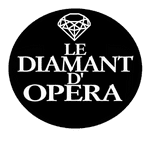Press

« Sébastien Daucé’s conducting dashes from one side to the other in large, supple gestures, sweeping not only the pit but also the stage in accents that are all the more impressive because they mark phrasing with fully nourished sonorities. » – Ôlyrix

« The Correspondances ensemble is in top form, pouring out streams of refined sound, with strong lines that magnify the quiet or sad moments of the score. » – Diapason

« The instrumental textures provided by Ensemble Correspondances are testament to their virtuosity, the ensemble’s tasteful ornamentation and nuanced articulation continually highlighting layers of beauty and intricacy in Charpentier’s music. » – Gramophone
Last news

« Conductor Sébastien Daucé restored the orchestration for his excellent ensemble Correspondances. He presents a high-quality version of the work, in a co-production with various opera houses, including the Aix-en-Provence Festival. » – Ouest France

« The musicians’ complicity is evident from the opening notes, with a rich sound that takes on infinite nuances throughout the evening. The orchestra’s beautiful energy highlights the precision of the rhythmic work and the artistry of the atmospheres. » – Forum Opera

« Under the direction of Sébastien Daucé, the Ensemble Correspondances delicately supports the vocal richness. The cohesion is total: the musicians accompany and breathe with the singers, while enhancing the theatricality specific to Baroque music. The conductor brings out emotions with a finesse of color and a sense of instrumental phrasing that matches the text. » – Olyrix

« This choral fresco is as impressive for its density as for the dedication of its performers, offering a reinvented coronation of Louis XIV, at the crossroads of theater and ritual. » – Olyrix

« Sébastien Daucé’s understated conducting brings to life the harmony between the musicians and singers. Serenity prevails over tragedy, with an emphasis on dialogue and communication between the performers and conductor, between the musicians and singers, and between the Correspondances ensemble and the audience. » – Forum Opera

« A production of rare elegance and relevance, a first-rate cast, and refined musical direction provide Francesco Cavalli’s opera with the ideal conditions for rediscovery. One of the highlights of the 2025 Aix-en-Provence International Opera Festival. » – Les Echos

« To prevent the music from evaporating, Sébastien Daucé did what composers did at the time: he reorchestrated it for 33 musicians, including 10 violins, 2 cornets, and 3 sackbuts, the ancestor of the trombone. It could have been heavy, but the conductor has such musical elegance and expertise in the repertoire that this instrumental opulence fills the space without saturating it. The contrasts are a little smoothed out, but the timbres are so beautiful and the line so fluid that it almost feels like Mozart, a good century ahead of its time. » – Le Figaro

« In a lavish reconstruction designed for the open air in Aix, Sébastien Daucé conducts Francesco Cavalli’s La Calisto. Sensual and refined, the music slips into a clear, if somewhat confined, scenic setting. » – La Croix

« In the courtyard of the Archbishop’s Palace, a superb adaptation of Francesco Cavalli’s Venetian opera by conductor Sébastien Daucé, who mischievously transposes the story to the era of “Dangerous Liaisons.” » – Télérama

« Under the lively and flexible direction of Sébastien Daucé, attentive to the slightest inflection, the Ensemble Correspondances simply worked wonders. » – Le Monde

« The best production was the last to open the festival. A flawless evening of opera, with an excellent cast of ten and lively playing in the pit by the Ensemble Correspondances and Sébastien Daucé. » – The New York Times
« A breathtaking and deliciously bold Calisto. » – Financial Times

« With her voice, whose timbre seduces with its shadows as much as its brilliance, and her unique inflections, Lucile Richardot leaves a deep impression on the pages she defends. » – Diapason

« This anthology of sacred music, each piece splendid in its own right, showcases Lucile Richardot’s noble, coppery alto voice, her ability to glide from softness to brilliance, and to accurately convey the style, climatic variations, and intention of each piece. » – Télérama

« The performance highlights the musical rhetoric, expressive contrasts, and subtlety of timbres. (…) A miracle of eloquence. » – Opéra Magazine

« Press review 2023 » – ensemble Correspondances

« Listening to this interpretation offers a chance to savour every aspect of it – the drama, the expression, the refined sound, the shading of dynamics and the expressive articulation. » – W Kulturalny Sposób

« The fact that Daucé opts for a small ensemble rather than a large number of musicians benefits the works. » – Der Spiegel

« When this atmospheric work is played by such exquisite musicians as the Ensemble Correspondances under Sébastien Daucé, it shines all the brighter. » – Falter.at

« The reading combines naturalness and contrasts in a spellbinding alchemy. » – Muse Baroque

« Sébastien Daucé’s Baroque Christmas at the Auditorium features sacred and secular music by Charpentier, his favourite composer. » – Exit Mag

« Best classical Christmas albums for La Messe de Minuit » – The Times

« A delightful blend of fervent solemnity and popular naivety, skilfully combining reflection and narration to seduce minds and better convert them. » – Le Soir

« Between passion and lament, the ensemble Correspondances follows the languorous lines of the score, deploying suppleness and subtlety with as much energy as tenderness. » – sceneweb.fr

« Sébastien Daucé’s conducting dashes from one side to the other in large, supple gestures, sweeping not only the pit but also the stage in accents that are all the more impressive because they mark phrasing with fully nourished sonorities. » – Ôlyrix

« The music is magnificent, magnified by the orchestra and choir. » – musicologie.org

« At the head of his ensemble Correspondances, Sébastien Daucé magnifies the colours and expressive vitality of Charpentier’s music. » – Journal La Terrasse

« Everything is perfectly clear to the ears, thanks to Sébastien Daucé’s always fluid interpretation, without any stiffness, and thanks to the admirably fresh voices, with such clear diction, of the choir of the ensemble Correspondances. » – Concertclassic.com

« The Correspondances ensemble is in top form, pouring out streams of refined sound, with strong lines that magnify the quiet or sad moments of the score. » – Diapason

« The music performed on Thursday evening brought tears to the eyes of some of the audience. Particularly in Act IV, where Jonathas is about to die: a moment suspended… » – Ouest-France

« The instrumental textures provided by Ensemble Correspondances are testament to their virtuosity, the ensemble’s tasteful ornamentation and nuanced articulation continually highlighting layers of beauty and intricacy in Charpentier’s music. » – Gramophone

« The sumptuous combination of liturgical sequences and popular Nativity tunes, in a complicit celebration of Charpentier’s sacred theatre. » – Télérama

« One of the finest moments in the Festival’s history. » – Crescendo Magazine

« The Vézelay Musical Encounters » – Classicagenda

« A chamber choir of ten marvellous singers and a small instrumental ensemble of phenomenal subtlety. » – Bachtrack

« Music carries the same emotions through the centuries. » – La Dépêche.fr
« The Normandy Musical Escape » – France Info : Culture
« Portrait of Sébastien Daucé by Concerti. » – Concerti

« The grandiose sobriety of the Masters of Notre-Dame de Paris. » – Première Loge

« A concert of sacred music by the Chapel Masters of Notre-Dame de Paris. » – Ôlyrix
« A universal story about a world without direction. » – SWR Kultur

« […] the excellent Ensemble Correspondance conducted by Sébastien Daucé […] » – Il giornale della musica

« Psyche, dramatick opera by Matthew Locke » – Actu-Juridique.fr

« Opera Album Review: A Major Baroque Opera in English Receives a Stylish Recording » – The arts fuse

« Polyphonic Splendors » – Scherzo

« 40 years of FeMÀS between recollection and enthusiasm » – Queplan

« Sébastien Daucé, offered interpretations of an authentic baroque orchestra » – El Correo de Andalucia

« The ensemble has demonstrated the reasons for its well-deserved prestige » – Diaro de Sevilla

« Power and grace » – ResMusica

« The ensemble plays and sings superbly » – Luister